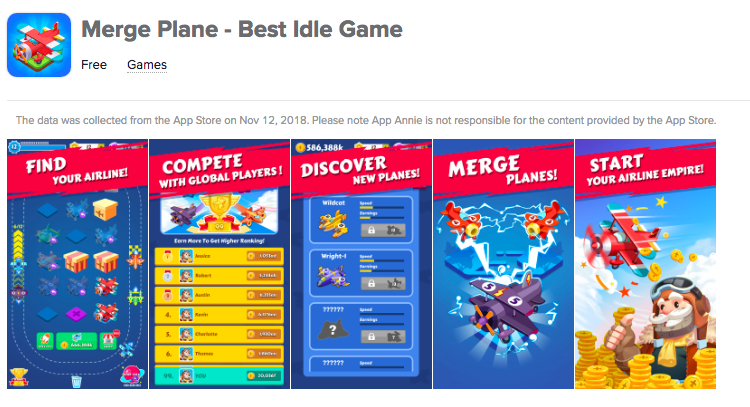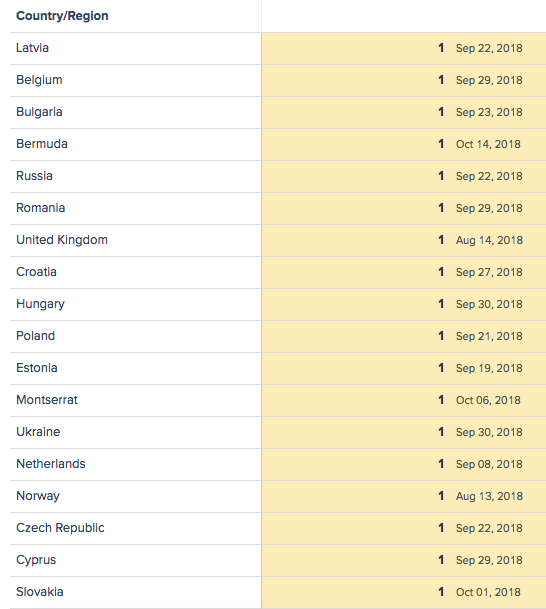Idle Clickers – How much fun clicking can be?
Idle in English means (in other words) inactive. The Idle Clicker game should, therefore, be translated as inactive clicking. Another name is Incremental game. Productions from this newly born genre have managed to settle down for good on mobile platforms and in 2019 pop up like mushrooms in stores: Google Play and the App Store. Do these titles actually only provide residual interaction? What are they attracting players with? How are the users involved in Idle Clickers? What is the main monetization model of Idle Clickers? Why, in the future, can we hear of even more variations of this idea?
Build your own Empire by clicking
You start from scratch. Click. You earned your first money. Click. You’ve built or created
your first unit. Click. Next. Click. You start earning automatically. Click. You are buying more and more powerful units, but these with each purchase are becoming more and more expensive. Click. You buy upgrades to make you earn more money and space for more units. Hundreds of clicks later you do not even have to click yourself. You deal with publishing money for further improvements. You’ve built your Empire. Is this the end of the game? Not at all. Some improvements are beyond your reach. You can buy them for a special currency. How to get it? Resetting the game and starting everything from the beginning. More or less this is the idea behind Idle Clicker games. As you can see, gameplay is not only down to clicking one button. The player creates more and more efficient sources of earning money. At the same time, it dynamically increases the price. The collected budget can be used to purchase items or skills that enable a faster or automatic way of earning money. Ultimately the game goes down to managing simplified economics.
How did Idle Clickers come into life?
Idle Clickers came from … a joke. And more bitter satire of new trends in game industry. In 2010, at the Game Developers Conference, the award for the best new social game/ online went to FarmVille from Zynga. At the event among invited guests was Ian Bogost, an American scholar and video game designer who he was very critical about this decision. In his opinion, the Zynga business model is based on getting players to spend money for further progress in the game instead to focus on artistic experience. He also claimed that the vice president of the company, Bill Mooney, during the speech tried to put pressure on other independent developers encouraging them to recruit. Bogost called the game of this type: “cow clickers “, because he thought that all interaction comes down to clicking according to the cow model and collecting virtual gold.
In July 2010, preparing for a seminar on social games at The University of New York, he decided to create a simple game that would illustrate controversial aspects of such production. Developing took him 3 days, and the mechanics resisted to encourage users to invite friends to the game and their involvement through the possibility of purchasing further virtual goods. To his surprise, his game quickly went viral, and in September 2010 it collected 50,000 players on Facebook. Exactly a year after its release, Bogost launched a countdown timer in the app to the “cow’s apocalypse”. From then on, every player click counted down another 30 seconds. The only option to extend the correct operation of the application was to pay Facebook credits. After collecting $ 700, the clock counted to zero on September 7, 2011. The game had still remained playable, but the cows’ models were turned into black squares. In response to complaints from players that the game in this form does not bring pleasure, Bogost replied that “before it was not fun either”.
Although Cow Clicker was supposed to be just a parody of a social game, its success could not remain unnoticed. The imitators arrived not soon after. In April 2013 in browsers Candy Box! Has its debut, however, the greatest success is achieved by released a few months later Cookie Clicker. Written in one evening by the French programmer, Julien “Orteila” Thiennot, and published on the 4chan forum in the form of a link in several hours gathered 50,000 players. After a month, it was an average of 200,000 and a record amounted to 1.5 million openings in just one day. Ian Bogost called the game “logical Cow Clicker conclusion”. The mechanics were based on the same idea. The player’s task was baking cookies. One click brought one cake, these could be used for grandma’s hiring, which automatically generated more cookies. After some time the player could build factories, mines, and even bring them from other planets. Funny idea after some time turned into an ominous image of capitalism. People were crazy about the cakes, and grannies took over the world. Cookie Clicker has been updated to this day and has a loyal fan base. The last version comes from October 2018.
Another milestone in the Idle games is Clicker Heroes. Released in 2014 by Playsaurus studio initially on web browsers, and from 2015 available on the Steam platform and mobile devices. The title had been sustained for a long time on the list of the most-loved items on personal computers next to the newest AAA games. In 2017, it was even imported into the PS4 and Xbox One consoles. Although playing involved fighting, the same skeleton of the game was twin similar to Cookie Clicker. From defeated opponents, the player collects gold which he allocates for further improvements. After some time, the game can make progress without the player’s participation. Continuation of Clicker Heroes raises another barrier of incremental games. All the productions discussed so far have been free. They could contain micro-transactions, but the player was not forced to pay real cash. However, Clicker Heroes 2 is currently in basic access on Steam and costs $30. Breaking with the Free to Play distribution model (F2P) is risky and has mixed opinions among players.
Why are Clickers so popular?
How do Idle games attract players? It is very easy. They are above all very affordable and do not force you to constantly watch what is happening on the screen. Thanks to that, they are ideal productions for short sessions. They can fulfil the hours spent in the office or on the means of transport. Games of this type do not punish users for the lack of regular login or unsuccessful gameplay. They work in the background and everyone returns to them generously rewarded. The longer the user stays out of the game, the greater the inventory is waiting for him after resuming the game. It creates a natural need to return. The reward system is transparent and understandable even from the beginning even for the very Sunday players. The impression of continuous progress makes the experience pleasant. The player feels constantly rewarded. For these reasons, applications have an unusually high retention rate. A week after starting, almost half of users play them regularly, and even after a month, 15-20% of players return to them.
How do Idle Clickers make money?
Idle games are cheap to produce, and the development cycle is short. Many of them are spinoffs of other well-known brands and production boils down to almost proven ‘reskin’ mechanics, which obviously translates into cost reduction. Most Idle Clickers are Free to Play productions and monetization of the game for this distribution model is based on micro-transactions and advertising. In the game focused on the increment, they have been woven into more organically. In Idle games there are usually three currency types: soft, which the player earns during the game; hard, which you earn a lot slower or you can buy for real money; prestigious, usually available after resetting the game.
The player can exchange a hard currency for a temporary acceleration of time and earnings, speed and income multipliers, prestigious currency without resetting of progress or purchase of a lootbox / participation in a lottery with rare and legendary items (Clicker Heroes popularised the mechanics of collectible card games).
Incremental game mechanics is an excellent environment for advertisers.
Players are rewarded for watching ads. It can be a currency, temporary improvement or removal of negative status of units. The ads integrated in this way are several hundred clicks fewer to achieve the goal. Thanks to this, players are more willing and above all independently decide to interact with the advertisement. This is a natural element of the game itself which accelerates the progress of it.
Merge Plane – Click & Idle Tycoon
The most popular games on mobile platforms are those that allow short sessions, offer intuitive gameplay and instant satisfaction. And that’s what Merge Plane is, an economic strategy released a few months ago on iOS and Google Play. Almost anyone can play the game and enjoy the progress made.
The gameplay involves developing your own airlines. We buy more and faster planes and put them in motion by moving them to the runway. Each subsequent flight pictured in the form of a circle brings us income. Progress is pleasant, we quickly gain more positions for airplanes and runways. Most fun makes pairing the same models and creating faster units. The player intuitively awaits the moment until it will be possible to create completely a new airplane in their fleet. Such game in associations is strongly addictive and gives constant supply of dopamine.
Of course, as a classic clicker does, the player develops further elements. Merge Plane has three forms of currency, the basic one we earn even when we are out of the game, and we’ll buy more aircraft models for it. The other can be obtained through exchange of payment means at the appropriate conversion rate and it allows for buying permanent improvements, such as increased revenue or discounts on models available in the store. The last currency represented in the form of diamonds one has to try harder to obtain. We receive it for returns to the game and to perform quests and by achieving next milestones in our business. Daily tasks involve creating or buying several aircraft of one type or viewing several ads. A prestigious stone we can exchange for the fastest available airplanes in our fleet, instant boosts, speed up the progress in time (e.g. by 2 days) or take part in the lottery.
The application on Android does not exceed 128 MB, on Apple devices it takes a bit more, i.e. 422.6 MB. This probably results from the update, because there is a newer version available for iOS version of the game marked with the number 1.26 enriched with a competitive tournament mode. The layout is neat, and the most important title works smoothly even on the older ones mobile devices. Merge Plane on iTunes has been rated by nearly three hundred eighty thousand players and maintains an average of 4.8. On Google Play over 1 million two hundred thousand people voted for it (sic!) with a sensational average at the level of 4.7.
n the App Store, the game brought about 397.956 USD to game developers in July, August and September in the United States, Germany, Great Britain, France and Australia,
The game has micro-transactions. In addition to the standard packages of the prestigious currency, it is possible to buy a weekly subscription. For about $6 we remove obligatory ads from the app, we get two additional parking aprons for aircraft, another starting lanes, we accelerate the speed of our fleet by 50% and get 10 additional diamonds every day, which are the equivalent of even the opportunity to participate in two lotteries. In August and September 2018, the game occupied leading positions in the App Store.
Can you change the world by clicking?
Clickers can have a bright future. Games of this type are easy to produce, which makes them easy to be created by an independent development studio, or even individual programmers. They are very intuitive to use, and at the same time offer a key element of games – joy of progress in the game. Thanks to this, they can be popular among both Sunday and experienced players. Many Idle games have gained viral popularity and quickly gathered devoted fans around. Frequent returns and short sessions support their expansion on mobile devices. It is said that the production of Idle game does not require thinking about what else you can add to it and what to remove without spoiling the fun.
Nevertheless, Idle Clickers have great potential to develop and incorporation of relevant ideas can significantly diversify gameplay. Thanks to the mechanics based on incremental of virtual goods, where watching commercials is an organic element of the game, titles of these types have a huge marketing value and are a tasty morsel for advertisers. Will clickers stay in the gaming world? For now, the market is absorbent. Other applications break records. Playsaurus with its Idle Action RPG risked with a paid distribution model. Time will verify if players love clicking so much.
Ad Fraud Predictions 2018
Idle in English means (in other words) inactive. The Idle Clicker game should,...



